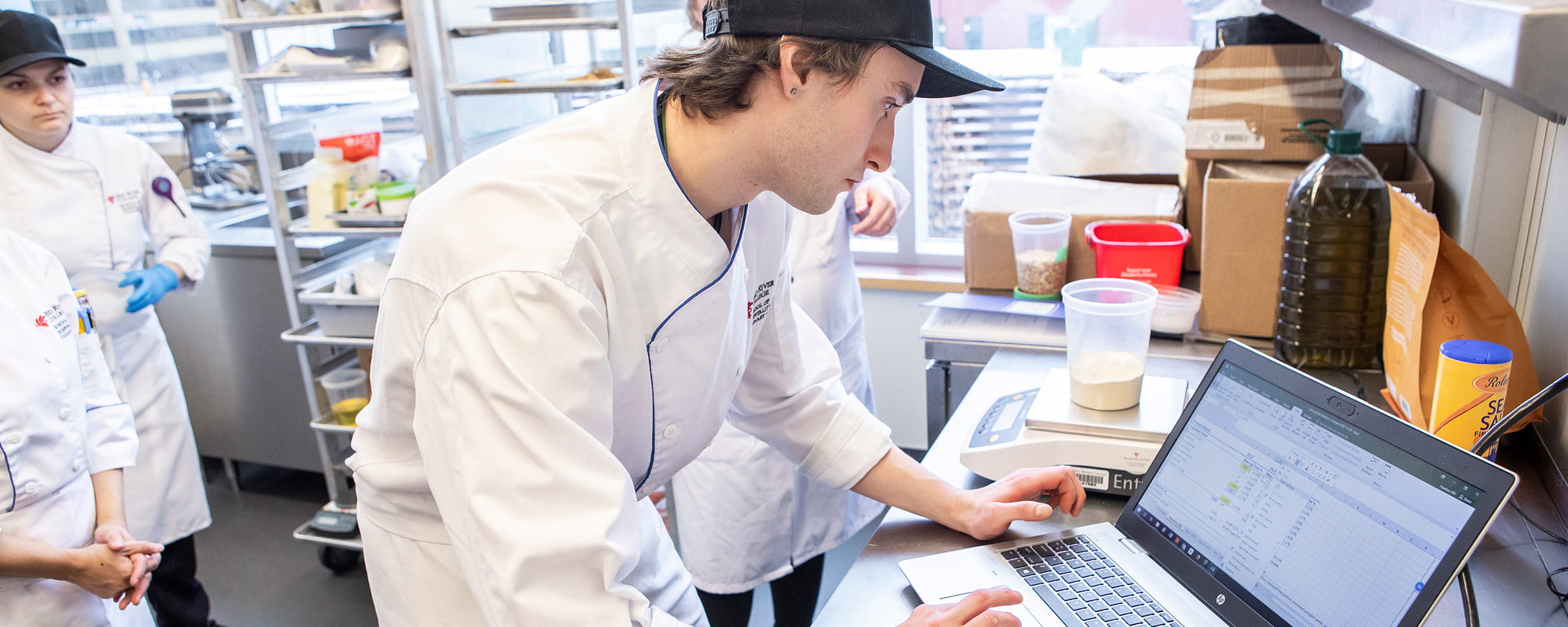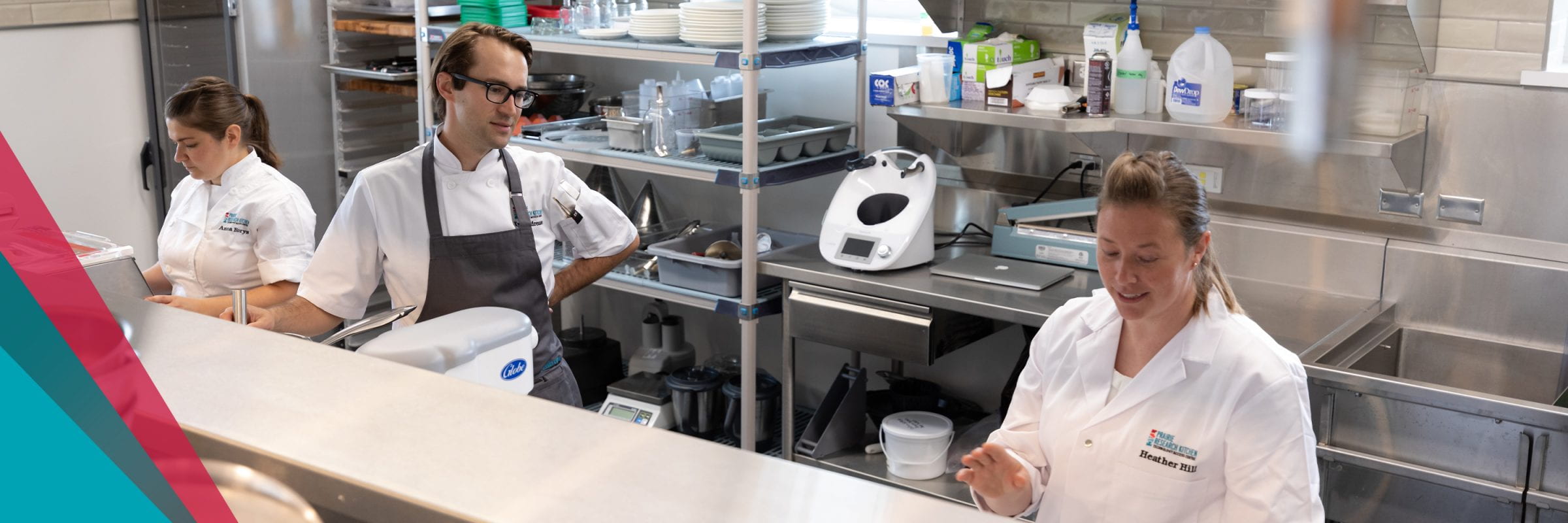



RRC Polytech’s Prairie Research Kitchen supports industry growth by leveraging College infrastructure and instructor expertise into applied research and training. The research team’s unique blend of culinary skills and food science knowledge drives creative new applications of Canadian food products.
Companies continue to approach the College for collaboration, and industry partners such as the National Research Council of Canada Industrial Research Assistance Program (NRC-IRAP), University of Manitoba, Food Development Centre, and Manitoba Agriculture refer companies to us based on past successful project outcomes.
“I think what you are doing [at Prairie Research Kitchen] is great for our small processors to take the next step in product development to achieve a product that can be adapted to a wider range of uses.”
– Joy Lorette, Business Development Specialist, Manitoba Agriculture
A strategic plan for a culinary research program at RRC Polytech was developed in 2012 to prepare for an investment from Western Economic Diversification (WD) and corporate partners to build and equip the Paterson GlobalFoods Institute (PGI). This facility now houses the School of Hospitality and Culinary Arts. The WD agreement required the school to undertake food technology research with Manitoba food manufacturers. Stakeholder interviews were conducted over an eight-month period to define current food research capabilities in the province, as well as reviews of existing culinary research programs throughout the country.
The local industry confirmed that the “culinary capabilities offered by PGI will complement the scientific and business skills currently offered in Manitoba.” The review also identified three strategic research themes: food for enhancement of health and wellness, sustainability in food and food service industries, and promotion of local products.
In 2013, RRC Polytech developed a culinary research model based on the strategic plan to engage chefs in industry research projects, and to further refine industry needs by addressing stakeholder questions and opinions. One extension of the plan was to play a role in helping food manufacturers better access the Manitoba food service industry.
Applied research projects with industry were undertaken using the newly established kitchens at PGI and with the expertise of chefs from the Culinary Arts teaching program. Funding from the Natural Sciences and Engineering Research Council of Canada’s (NSERC) Engage grants enhanced the scope and access to scientific resources as needed. Outreach activities resulted in approximately 30 small engagement activities – from small trials and chef feedback with new ingredients to group technology demonstrations.
The program also received research grants from the Manitoba Pulse Growers Association. Based on initial product development and consumer survey projects, RRC Polytech provided new food applications, new products, and new market insights for local companies and producer groups. These applied research projects established the need for a five-year, $2.3-million NSERC Innovation Enhancement (NSERC IE) grant, awarded in March 2016. This established the predecessor of the Prairie Research Kitchen – the Culinary Research & Innovation program (CRI) – with full-time staff.
Although the WD grant provided equipment, it was to be shared with a very busy academic program, as well as continuing education training opportunities. With an increasing number of industry projects, the research team quickly outgrew its available equipment and space. The CRI team needed dedicated space, so an application was submitted to the Canadian Foundation for Innovation (CFI) and Research Manitoba – with $2 million awarded to RRC Polytech in 2017.
Construction of this dedicated space, the Culinary Research Innovation Suite, started in October 2018. The new suite has been designed to provide permanent basic equipment, avoid duplication with major pieces available in PGI (e.g. Baking Lab), and provide additional modular space to bring in temporary project-specific equipment as needed.
Located on the 11th floor of the PGI, the Culinary Research Innovation Suite was inaugurated in May 2019. The $2.75-million facility allows companies to work side-by-side with RRC Polytech researchers, chefs and students, run focus group and ideation sessions with researchers and instructors, and increase the necessary product development analytical capabilities to address safety and quality issues during development. The facilities are also available to instructors and students to introduce new equipment and techniques such as fermentation, culturing, and charcuterie.
In June 2019, the former Culinary Research innovation (CRI) program received a Technology Access Centre (TAC) grant from NSERC, providing $1.75 million over five years. This is RRC Polytech’s third Technology Access Centre, joining the existing Building Efficiency Technology Access Centre (BETAC) and the Technology Access Centre for Aerospace and Manufacturing (TACAM).

The new name – Prairie Research Kitchen – was created in October 2019, along with a new word mark. The name of the Culinary Research innovation Suite was also changed to Prairie Research Kitchen.
A new name was created to pull together the programs and the new facility under one name and one mandate – to help Western Canadian food manufacturers and food service companies access the valuable resources at RRC Polytech. The Prairie Research Kitchen was officially declared “open for business” in October 2019.
RRC Polytech campuses are located on the lands of Anishinaabe, Ininiwak, Anishininew, Dakota, and Dené, and the National Homeland of the Red River Métis.
We recognize and honour Treaty 3 Territory Shoal Lake 40 First Nation, the source of Winnipeg’s clean drinking water. In addition, we acknowledge Treaty Territories which provide us with access to electricity we use in both our personal and professional lives.